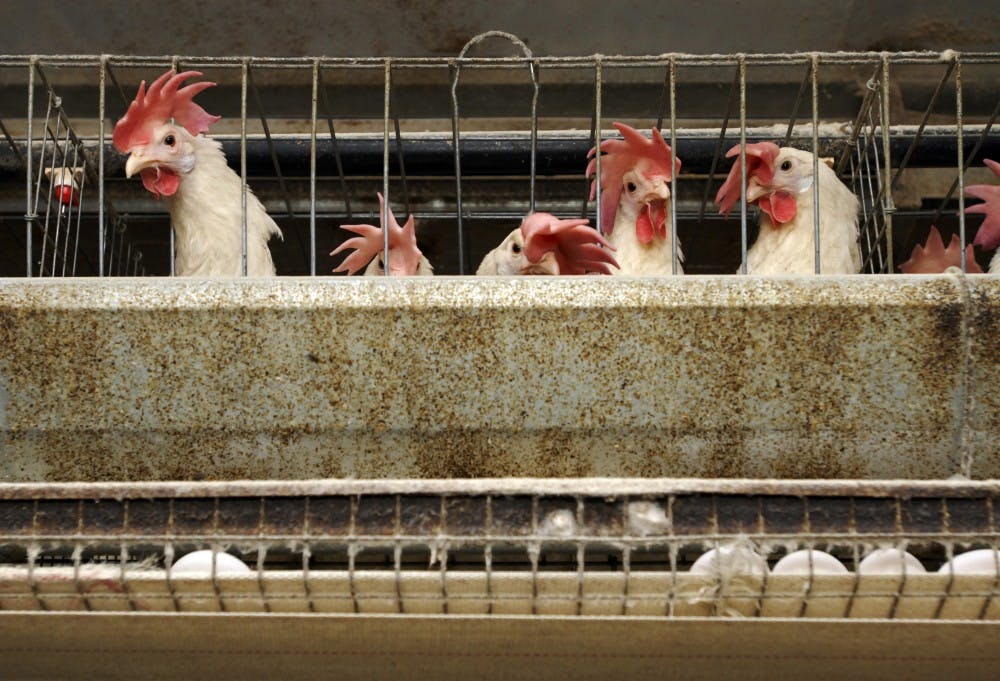A bipartisan bill that would have regulated industrial-sized farms was shot down Wednesday, 9-3, in the House Committee on Environmental Affairs.
House Bill 1378, introduced by Rep. Sue Errington (D-Muncie) would have allowed the Indiana Department of Environmental Management (IDEM) to effectively deny a permit for new industrial-sized farms unless they are more than one mile from any public property, or comply with ordinances aimed at effectively reducing groundwater and air pollutions.
An industrial-sized farm, also known as a concentrated animal feeding operation (CAFO), is defined as any farm with more than 300 cattle, 600 swine or sheep, 30,000 chickens or 500 horses.
Current regulations allow CAFOs to be built 100 feet away from any public structure, regardless of property line. And there are no caps on the amount of livestock a CAFO can have, meaning literal tons of waste can be produced.
Indra Frank, director of environmental health and water policy at the Hoosier Environmental Council (HEC), said she has analyzed more than 100 reports and studies on the public health implications of CAFOs.
Frank said reports have found 76 percent of stream miles in Indiana have tested positive for E. coli, most of which can be tested back to waste produced by CAFOs. According to the Mayo Clinic’s website, E. coli can cause diarrhea and vomiting and more severe effects to people with immune deficiencies and pre-existing additions.
Additionally, Frank said the air pollutants produced by CAFOs can cause complications for people, particularly children, with asthma or adults with lung disease and respiratory problems.
Other concerns supporters voiced centered around the amount of pollutants CAFOs generate, which they say contaminates Indiana's air and water sources and can cause detrimental health effects to people living in the surrounding area.
Mariah Bowman, Ball State student and president of Student Animal Activists, applauded the bill, saying legislation of this kind in a right-leaning state like Indiana is “revolutionary.”
“Hopefully this is the beginning of a more environmentally friendly economic structure for the Midwest,” Bowman said.
Of the 32,000 miles of streams assessed in Indiana, 10,000 of the miles were attributed to CAFOs, Frank said, citing a study.
HEC Director of Agriculture Policy Kim Ferraro compared how much waste a cow produces compared to humans on a daily basis. On average, humans produce one pound of feces a day. Cows, on the other hand, each produce 82 pounds of feces a day.
Ferraro said a CAFO of 4,000 cattle produces the same amount of waste as a city of more than 300,000 people. Ferraro was adamant that having this high amount of waste production so close to public property and sources of water could have detrimental effects on the environment and public health if not regulated.
Amy Gregg, chairperson for the Ball State department of natural resources and environmental management, said farming regulation is a very complex issue with a lot of money and stakeholders involved.
Gregg said she understands concerns surrounding CAFOs, but many of the large farm owners she has been in contact with are “very careful” with how they manage and transport manure to keep it out of the state’s waterways.
The bill’s opponents argued no new CAFOs would be built if they were forced to be a mile away from public property, decreasing the amount of agriculture business present in the state.
Rep. Mike Aylesworth (R-Lowell), who was one of the dissenting voters in the party line vote to shut down the bill, cited “unsubstantiated science” as the reason for his no vote.
Contact Riley Eubanks with comments at rjeubanks@bsu.edu.





